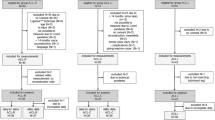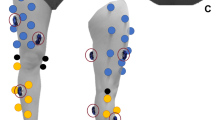Abstract
Ligamentomuscular and muscular stretch reflexes are known to contribute to knee joint stability. After anterior cruciate ligament (ACL) injury, a more intense and adjusted muscular response is required to maintain joint stability, but this neuromuscular control of the knee has not been clearly proved. The aim of the study is to record electromyography (EMG) signal and muscular fibre length variations in quadriceps and hamstrings of the knee with and without ACL, and to analyze and integrate the ligament strain and the muscular reaction to forced anterior tibial translation (ATT). In 17 knees from 12 cats, EMG electrodes and ultrasonomicrometry crystals were inserted into four main periarticular muscles, with strain gauges on periarticular ligament insertions. Their output signal was compared before and after ACL surgical section in series of ATT (at 90° and 30° knee flexion), and also during knee flexion and extension. Linear regression analysis was performed between the EMG signal and muscular fibre length variations, and between the EMG signal and the strain on ligament insertions, in the search of this reflex neuromuscular response. In the ACL deficient knees, the studied muscles showed a poor adjustment to motion of EMG firing, inversely to controls. The muscle stretch reflexes showed poorer correlation with post-peak EMG activity than the ligaments. ATT control depended mainly on hamstrings activity in control knees, whereas in unstable knees, quadriceps activity was associated with more tibial translation. Acute ACL-deficient knees showed poor neuromuscular control with weak ligamentomuscular reflexes and no muscular stretch reflexes, suggesting the ineffectiveness of acute muscular reaction to provide early mechanical knee stabilization after injury.




Similar content being viewed by others
References
Adachi N, Ochi M, Uchio Y, Iwasa J, Ryoke K, Kuriwaka M (2002) Mechanoreceptors in the anterior cruciate ligament contribute to the joint position sense. Acta Orthop Scand 73:330–334
Ageberg E (2002) Consequences of a ligament injury on neuromuscular function and relevance to rehabilitation - using the anterior cruciate ligament-injured knee as model. J Electromyogr Kinesiol 12:205–212
An K-N (2002) Muscle force and its role in joint dynamic stability. Clin Orthop Relat Res 403S:S37–S42
Beynnon B, Johnson R, Fleming B (2002) The science of anterior cruciate ligament rehabilitation. Clin Orthop Relat Res 402:9–20
Biau DJ, Tournoux C, Katsahian S, Schranz PJ, Nizard RS (2006) Bone-patellar tendon-bone autografts versus hamstring autografts for reconstruction of anterior cruciate ligament: meta-analysis. BMJ 332:995–1001
Biewener A (2002) Future directions for the analysis of musculoskeletal design and locomotor performance. J Morphol 252:38–51
Biewener A, Corning W (2001) Dynamics of mallard (Anas platyrhynchos) gastrocnemius function during swimming versus terrestrial locomotion. J Exp Biol 204:1745–1756
Bonsfills N, Raygoza JJ, Boemo E, Garrido J, Nunez A, Gomez-Barrena E (2007) Proprioception in the ACL-ruptured knee: the contribution of the medial collateral ligament and patellar ligament. An in vivo experimental study in the cat. Knee 14:39–45
Chmielewski TL, Ramsey DK, Snyder-Mackler L (2005) Evidence for differential control of tibial position in perturbed unilateral stance after acute ACL rupture. J Orthop Res 23:54–60
Chmielewski TL, Rudolph KS, Snyder-Mackler L (2002) Development of dynamic knee stability after acute ACL injury. J Electromyogr Kinesiol 12:267–274
Dhaher YY, Tsoumanis AD, Rymer WZ (2003) Reflex muscle contractions can be elicited by valgus positional perturbations of the human knee. J Biomech 36:199–209
Dyhre-Poulsen P, Krogsgaard MR (2000) Muscular reflexes elicited by electrical stimulation of the anterior cruciate ligament in humans. J Appl Physiol 89:2191–2195
Engstrom B, Gornitzka J, Johansson C, Wredmark T (1993) Knee function after anterior cruciate ligament ruptures treated conservatively. Int Orthop 17:208–213
Fischer-Rasmussen T, Jensen TO, Kjaer M, Krogsgaard M, Dyhre-Poulsen P, Magnusson SP (2001) Is proprioception altered during loaded knee extension shortly after ACL rupture? Int J Sports Med 22:385–391
Freeman MA, Wyke B (1967) The innervation of the knee joint. An anatomical and histological study in the cat. J Anat 101:505–532
Gillis G, Biewener A (2001a) Hindlimb muscle function in relation to speed and gait: in vivo patterns of strain and activation in a hip and knee extensor of the rat (Rattus norvegicus). J Exp Biol 204:2717–2731
Gillis G, Biewener A (2001b) Plasticity in limb muscle function during rat locomotion. Society for Integrative and Comparative Biology Annual Meeting, Chicago
Gómez-Barrena E, Martínez-Moreno E, Munuera L (1996) Segmental sensory innervation of the anterior cruciate ligament and the patellar tendon of the cat’s knee. Acta Orthop Scand 67:545–552
Gómez-Barrena E, Núñez A, Ballesteros R, Martínez-Moreno E, Munuera L (1999) Anterior cruciate ligament reconstruction affects proprioception in the cat’s knee. Acta Orthop Scand 70:185–193
Gómez-Barrena E, Núñez A, Martínez-Moreno E, Valls J, Munuera L (1997) Neural and muscular electric activity in the cat’s knee. Acta Orthop Scand 68:149–155
Grabiner MD, Koh TJ, Miller GF (1992) Further evidence against a direct automatic neuromotor link between the ACL and hamstrings. Med Sci Sports Exerc 24:1075–1079
Griffiths R (1987) Ultrasound transit time gives direct measurement of muscle fiber length in vivo. J Neurosci Methods 21:159–165
Grood E, Suntay W (1983) A joint coordinate system for the clinical description of three-dimensional motions: application to the knee. J Biomech Eng 105:136–144
Halata Z, Haus J (1989) The ultrastructure of sensory nerve endings in human anterior cruciate ligament. Anat Embryol (Berl) 179:415–421
Herzog W, Archambault J, Leonard T, Nguyen H (1996a) Evaluation of the implantable force transducer for chronic tendon-force recordings. J Biomech 29:103–109
Herzog W, Hasler E, Leonard T (1996b) In-situ calibration of the implantable force transducer. J Biomech 29:1649–1652
Herzog W, Longino D, Clark A (2003) The role of muscles in joint adaptation and degeneration. Langenbecks Arch Surg 388:305–315
Hill R, Kleinman L, Chitwood WJ, Wechsler A (1978) Segmental mid-wall myocardial dimensions in man recorded by sonomicrometry. J Thorac Cardiovasc Surg 76:235–243
Hinterwimmer S, Baumgart R, Plitz W (2002) Tension changes in the collateral ligaments of a cruciate ligament-deficient knee joint: an experimental biomechanical study. Arch Orthop Trauma Surg 122:454–458
Hogervorst T, Brand RA (1998) Mechanoreceptors in joint function. J Bone Joint Surg Am 80:1365–1378
Hogervorst T, Brand RA (2003) Joint mechanoreceptors and knee function. In: Pedowitz R (ed) Daniel’s knee injuries ligament and cartilage structure, function, injury, and repair. Lippincott, Philadelphia, pp 138–143
Hoyt D, Wickler S, Biewener A, Cogger E, De la Paz K (2005) In vivo muscle function vs speed. I. Muscle strain in relation to length change of the muscle-tendon unit. J Exp Biol 208:1175–1190
Jennings A, Seedhom B (1994) Proprioception in the knee and reflex hamstring contraction latency. J Bone Joint Surg 76-B:491–494
Johansson H, Sjolander P, Sojka P (1991) A sensory role for the cruciate ligaments. Clin Orthop Relat Res Jul:161–178
Krogsgaard MR, Dyhre-Poulsen P, Fischer-Rasmussen T (2002) Cruciate ligament reflexes. J Electromyogr Kinesiol 12:177–182
Maitland M, Leonard T, Frank C, Shrive N, Herzog W (1998a) Longitudinal measurement of tibial motion relative to the femur during passive displacements in the cat before and after anterior cruciate ligament transection. J Orthop Res 16:448–454
Maitland M, Leonard T, Frank C, Shrive N, Herzog W (1998b) Method to assess in vivo knee stability longitudinally in an animal model of ligament injury. J Orthop Res 16:441–447
Moritani T, Yoshitake Y (1998) 1998 ISEK congress keynote lecture: the use of electromyography in applied physiology. International Society of Electrophysiology and Kinesiology. J Electromyogr Kinesiol 8:363–381
Mutsuzaki H, Sakane M, Ikeda K, Ishii T, Hattori S, Tanaka J, Ochiai N (2007) Histological changes and apoptosis of cartilage layer in human anterior cruciate ligament tibial insertion after rupture. Knee Surg Sports Traumatol Arthrosc 15:602–609
Nakajima M, Kawamura K, Takeda I (2003) Electromyographic analysis of a modified maneuver for quadriceps femoris muscle setting with co-contraction of the hamstrings. J Orthop Res 21:559–564
Nichols TR (2002) The contributions of muscles and reflexes to the regulation of joint and limb mechanics. Clin Orthop Relat Res 403S:S43–S50
Orlovsky G, Deliagina T, Grillner S (1999) Quadrupedal locomotion in mammals. In: Orlovsky G, Deliagina T, Grillner S (eds) Neuronal control of locomotion from mollusc to man. Oxford University Press, New York
Parmiggiani F, Stein RB (1981) Nonlinear summation of contractions in cat muscles. II. Later facilitation and stiffness changes. J Gen Physiol 78:295–311
Populin LC (2005) Anesthetics change the excitation/inhibition balance that governs sensory processing in the cat superior colliculus. J Neurosci 25:5903–5914
Solomonow M, Baratta R, Zhou E, Shoji H, Bose W, Beck C, D’Ambrosia R (1987) The synergistic action of the anterior cruciate ligament and thigh muscles in maintaining joint stability. Am J Sports Med 15:207–213
Solomonow M, Krogsgaard M (2001) Sensorimotor control of knee stability. A review. Scand J Med Sci Sports 11:64–80
Teixeira da Fonseca S, Silva PL, Ocarino JM, Guimaraes RB, Oliveira MT, Lage CA (2004) Analyses of dynamic co-contraction level in individuals with anterior cruciate ligament injury. J Electromyogr Kinesiol 14:239–247
Tsepis E, Vagenas G, Giakas G, Georgoulis A (2004) Hamstring weakness as an indicator of poor knee function in ACL-deficient patients. Knee Surg Sports Traumatol Arthrosc 12:22–29
Tsuda E, Ishibashi Y, Okamura Y, Toh S (2003) Restoration of anterior cruciate ligament-hamstring reflex arc after anterior cruciate ligament reconstruction. Knee Surg Sports Traumatol Arthrosc 11:63–67
Williams G, Barrance P, Snyder-Mackler L, Axe M, Buchanan T (2003) Specificity of mucle action after anterior cruciate ligament injury. J Orthop Res 21:1131–1137
Wojtys E, Huston L (1994) Neuromuscular performance in normal and anterior cruciate ligament-deficient lower extremities. Am J Sports Med 22:89–104
Zhou BH, Baratta RV, Solomonow M, Olivier LJ 3rd, D’Ambrosia RD (1996) Evaluation of isometric antagonist coactivation strategies of electrically stimulated muscles. IEEE Trans Biomed Eng 43:150–160
Acknowledgments
This study was supported with a grant by F.I.S. (Fondo de Investigaciones Sanitarias; 01/0371, Spain).
Author information
Authors and Affiliations
Corresponding author
Additional information
No benefits of any kind have been received by the authors for this study.
Rights and permissions
About this article
Cite this article
Bonsfills, N., Gómez-Barrena, E., Raygoza, J.J. et al. Loss of neuromuscular control related to motion in the acutely ACL-injured knee: an experimental study. Eur J Appl Physiol 104, 567–577 (2008). https://doi.org/10.1007/s00421-008-0729-3
Accepted:
Published:
Issue Date:
DOI: https://doi.org/10.1007/s00421-008-0729-3




